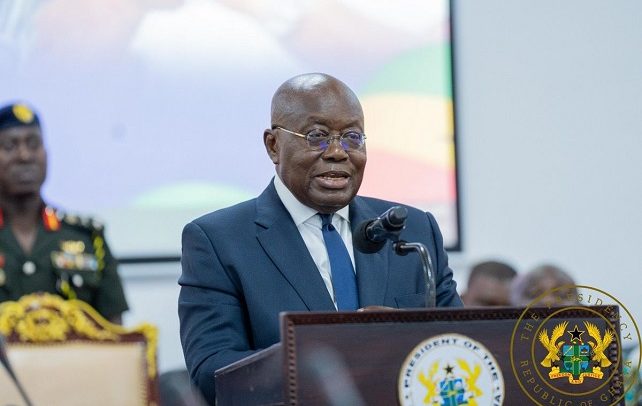President Nana Akufo-Addo
President Nana Akufo-Addo is pushing for the re-examination of the activities and operations of the Gulf of Guinea Commission (GGC).
The Commission was established by a treaty signed in Libreville, Gabon, in July 2001 to provide a framework for cooperation among member countries in protecting their maritime interests.
Its membership includes Liberia, Ivory Coast, Ghana, Togo, Benin, Nigeria, Cameroon, Equatorial Guinea, Gabon, São Tomé and Príncipe, Republic of Congo, Democratic Republic of the Congo, and Angola.
Having operated for the past 23 years, President Akufo-Addo believes a re-examination would help ascertain their efficiency level and ensure that it attains relevance, vibrancy and attractiveness.
This was contained in a speech read on his behalf by the Minister of Defence, Dominic Nitiwul, at the opening of the Sixth Ordinary Session of the Assembly of Heads of State and Government of Gulf of Guinea Commission at the Jubilee House in Accra yesterday.
The meeting was on the theme, “Building a Safe and Prosperous Gulf of Guinea for Sustainable Development”, and was attended by representatives of heads of state of member states of the GGC.
“I am very confident that we are aware of the immense potential and capability of the organisation if steered in the right direction. I, therefore, urge all member states of the organisation to show more political commitment at the highest level of government by ensuring participation in all statutory meetings at the highest and appropriate levels,” he stressed.
Whilst he admitted that the initial revitalisation efforts has yielded some positive outcomes, such as improved interaction with African regional economic communities and the African Union, especially regarding the 2050 Africa Integrated Maritime Strategy, President Akufo-Addo said the Commission was still far from achieving its aspirations more especially in light of the ongoing threats to the security and resources in the Gulf of Guinea.
That, he said, was because a rejuvenated Commission was essential to the collective pursuit of peace, security and stability in the respective countries, stressing that “no single country can address independently the multiplicity of evolving maritime threats within their territorial waters.”
The President also stressed the need for all concerned nations to build their capacities through strengthened cooperation and enhanced information sharing amongst countries bordering the Gulf of Guinea.
He was of the belief such collaborative interactions would ensure co-ownership of initiatives and enhance innovative approaches to tackle the security challenges and threats to maritime security in the Gulf region.
President Akufo-Addo also emphasised the need for new approaches to fund the activities and operations of the Commission.
His reason was that “from its inception to date, the Commission has been funded exclusively through the assessed contributions of member states. Our calls for the determination of alternative sources of funding have not yielded results, given the vested interest in the Commission’s output,” insisting “we have several opportunities to generate additional revenue to support its operations.”
He had cause to express concern about the recent trend in the payment of assessed contributions of member states, coupled with the expanding mandate of the Commission, and indicated that the continued total dependence on member states for funding was unsustainable in the medium to long term.
To this end, he said the Executive Secretariat must take necessary steps to identify alternative sources of funding for the organisation, adding that “Excellencies, our world is no longer stagnant.”
In this age of technology which has witnessed rapid transformations in all aspects of our lives, President Akufo-Addo said, “it is no longer prudent to be fixated on old ways of doing things,” and that “it is also precarious to remain indifferent to the fast-paced transformations occurring around us.”
On his part, Executive Secretary of the Commission, José Mba Abeso, said since their last summit, a significant progress has been made, and that the Commission has launched a number of projects aimed at improving maritime safety, combating illegal fishing, and protecting the environment.
He was, however, quick to admit that “there is still much to be done. One of the promising paths for the sustainable development of our region is the blue economy.”
This approach, he said, “Aims to sustainably harness our marine resources to drive economic growth, create jobs and improve livelihoods, while preserving the marine ecosystem,” whilst insisting “we must, therefore, redouble our efforts to promote sustainable fishing practices, develop coastal tourism and foster innovation in maritime industries.”
To effectively address current and future challenges, he said, “It is essential to revise the treaty establishing the Gulf of Guinea Commission,” insisting, “This review will allow us to adapt our legal and institutional framework to contemporary realities, strengthen regional cooperation and improve maritime governance.”
“We must work together to modernise this treaty, so that it reflects our shared ambitions and our strategic priorities,” he charged.
By Charles Takyi-Boadu, Presidential Correspondent


